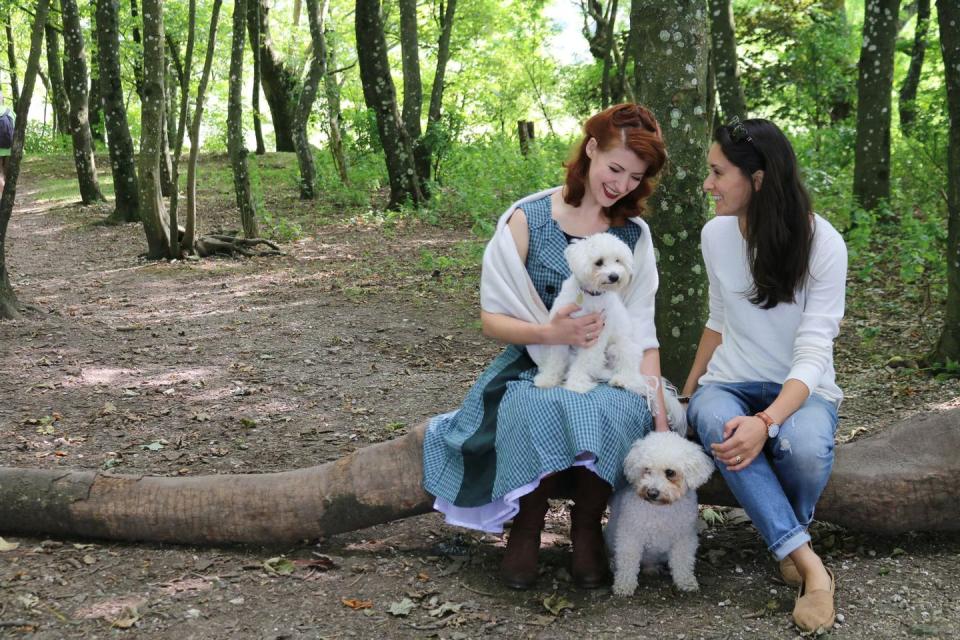"Women wanted to mother me": The realities of dating when you're gay and disabled

Picture the scene: a sunny Sunday morning, crisp white sheets, linen curtains billowing in the gentle breeze. Hours snuggled in bed together, happily chatting, feet entwined. You’re finally up and getting dressed but... something about her smell, her smile, makes you reach over, grasp her hand, spin her back around and…
POP!
Out comes her arm! And then the screaming starts… What’s your first reaction?
If you’re my wife, child of medics, possessor of an anatomy degree: roll your eyes, sigh a bit, casually reach over and pop that sucker back in. Maybe even grumble about not owning chickens, so you can’t have fresh eggs every morning. In fairness, my wife’s poached eggs are marvellous! They’re one of the reasons I married her - along with an unshakeably blasé attitude towards my latest medical dramas.
And I have a lot of medical dramas.

Thanks to being born with disabilities - Hereditary Neuropathy with Liability to Pressure Palsy (HNPP), Mixed Connective Tissue Disease (MCTD), and Postural Orthostatic Tachycardia Syndrome (POTS) - that affect my nerves, muscles, organs, hearing, sight, digestion, immune system and blood pressure, I’m no stranger to A&E.
Some days I use a wheelchair or crutches. Occasionally, I vomit from pain into the closest bin (apologies to my neighbours for that one!). Often I’ll dislocate a hip, shoulder, finger or even- when very amorous- a rib. Daily, my pain and exhaustion stop me doing routine things. I’m also deaf. And blind in one eye.
But that’s just my life! I don’t consider bad health or floppy limbs to be particularly tragic. Sadly, pre-marital bliss, I found that others didn’t feel the same way. First dates didn’t progress further after my answer to, “What music are you into?” began with, “Well, actually, I’m deaf so…”
A post shared by Jessica Kellgren-Fozard (@jessicaoutofthecloset) on Apr 2, 2018 at 10:25pm PDT
For context, I only lost my hearing in my teens and can lipread/guess well enough to reply. “You don’t sound deaf!” is an incredibly common comment on my YouTube channel from new viewers.
The people I dated before meeting my wife fell into two camps: the, ‘Oh My God, No, Please Leave’ or the, 'Yes, Let Me Mother You'- who treated me as an adorable non-sexual object they wanted to pet. No, thank you.
Regardless of medical annoyances, my loveless heart bothered me the most. Being gay narrows the potential dating pool. Finding someone within that group who fancied me (and I fancied back) but who also didn’t mind emptying sick buckets… let’s just say it wasn’t easy! Nevertheless, on First Date #371, in strolled a cheeky, grinning brunette who took one look at my hearing aids, assumed they were a Bluetooth headset and laughed uproariously when I corrected her.
I explained, adding that it came with other symptoms, but she was more interested in what I wanted to drink, and too busy asking did I particularly like National Trust houses? What were my thoughts on beaches, spicy food and weird science? As long as I made her laugh and shared her passions, she didn’t care what might potentially go wrong with my body. When the attraction is there, does anything else really matter?

This isn’t to say it’s been completely plain sailing. Dating someone means taking on their literal and metaphorical baggage, and disabled people have more accoutrements than average. Housing (but not being freaked out by) a wheelchair, crutches and wrist splints is one thing. Dealing with your girlfriend having a carer is quite another.
Having grown up with a chronic illness, I have no sense of personal space or privacy. I’m used to stripping off for doctors, being bathed by someone I met five minutes ago, and conducting meetings from my bed. It was a shock to realise she wanted to keep our co-owned spaces private. Though I hadn’t minded when it was my bed, she didn’t like strangers sitting on our bed. She positively hated having my carer in the house. It created a strange power-dichotomy: who had precedence? Who steps in first if I’m falling over? It’s strange and infantilising to watch the person you’re attracted to being physically helped by someone else.
Plus, having my carer walk in twice while we were in bed probably didn’t help much, either. Once we bought our own place, she put her foot down; the carer was to come in only when she was out at work. Instead, she did all of the little jobs that use up my energy and make me feel ill. From fetching drinks to helping me up the stairs - and the best part? She grabs my bum while she does it!
In the same way we sometimes forget we’re gay and that it’s ‘a thing’, we also forget I’m disabled, or deaf. We’re just two people with our own way of communicating... and sometimes one of us needs to be carried upstairs. My disabilities aren’t negatives or flaws, they’re just part of our life. It’s about what I give and have, not what I lack.
And, as she confided in me recently, a changeable medical condition does always keep our lives exciting! I was sure to remind her of this at 3am in A&E the other day, while she moaned about the uncomfortable chairs. And she just laughed at me.
Follow Jessica on Instagram, Twitter, YouTube, and Jessica and her wife Claudia on Instagram.
This article was originally published in 2017.
If you ever feel like you need any help or advice on coming out, contact Stonewall. For LGBTQ+ relationship and dating advice, counselling and therapy, contact Relate. For sexual health advice, you can get in touch with LGBT Foundation.
('You Might Also Like',)


